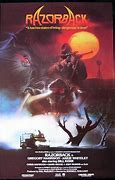FORMAT: DVD
ORIGINAL REVIEW:
(As posted on October 20th, 2020)
Razorback was the feature directing debut for Russell Mulcahy, who made quite a name for himself directing several music videos, most notably Duran Duran’s “Hungry Like the Wolf”. (The band’s “New Moon on Monday” is even heard in one scene.) Right away, it established the trademark style that would run throughout his career in films like Highlander, Ricochet, and The Shadow. It was written by the prolific Everett de Roche, who was also responsible for a slew of other Ozploitation flicks of the era including Long Weekend, Patrick, and Road Games.
The film follows in the Jaws mold as it’s about a giant killer animal (in this case, an enormous boar) running amok and eating people. (The crusty old big game hunter has more than a little bit of Quint in him.) There’s also a touch of Psycho in there too as the female lead gets offed early on. It probably could’ve done without the gratuitous opening that crassly exploits the “A dingo ate my baby” case, except… you know… with a giant boar instead of a dingo.
Beth (Judy Morris) is an American reporter who goes to the Australian outback to do a story on kangaroo poachers. She sticks her nose in where it doesn’t belong, and pretty soon a pair of skeevy poachers try to have their way with her. They are interrupted by the killer razorback and while they escape, the disgusting boar gobbles up poor Judy. Her husband Carl (Gregory Harrison) soon arrives on the scene to get revenge on the putrid piggy with the help of a grizzled hunter (Bill Kerr) and a sexy college student (Arkie Whiteley).
Mulcahy’s cinematic gymnastics, coupled with the excellent cinematography by Dean (The Road Warrior) Semler help disguise the fact that Razorback is just another interchangeable When Animals Attack flick. You know the old saying, “You can’t put lipstick on a pig?” Well, there you go. For fans of the genre, it should fit the bill. The final showdown is solid and Mulcahy delivers at least one quality jump scare.
The problem is the erratic pacing. All the stuff at the beginning with the poachers feels like filler. Almost as if the filmmakers wanted to squeeze in a “message” before getting down to the nitty gritty. Also, unlike, say Steven Spielberg, Mulcahy can’t really milk the suspense for all its worth when he’s keeping the killer animal hidden from the audience’s view. Whenever the razorback is shown in all its glory, the movie manages to come to life. However, when Harrison (who makes for a dull leading man) is busy trekking through the outback or wasting his time with the annoying poachers, this boar is a bore.
AKA: Razorback: Destructor.

No comments:
Post a Comment